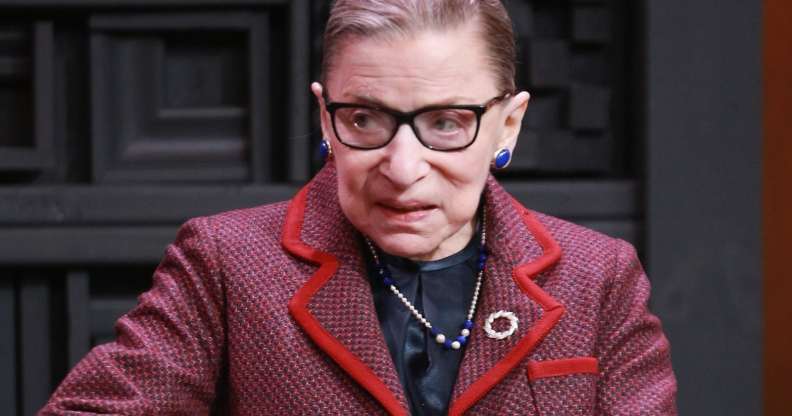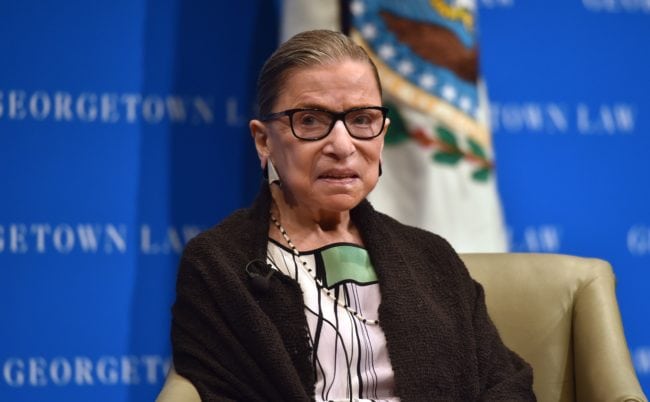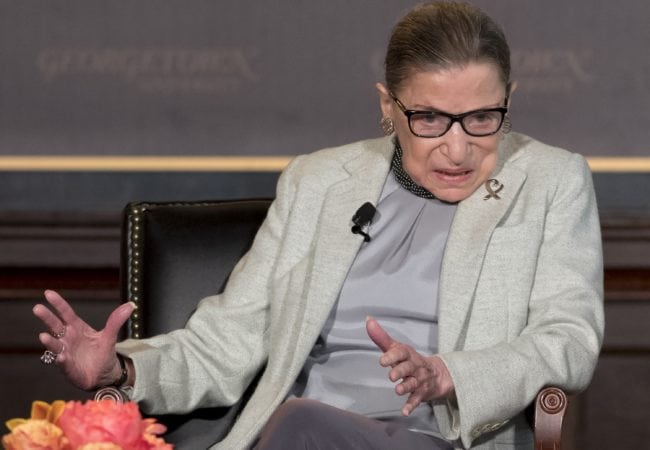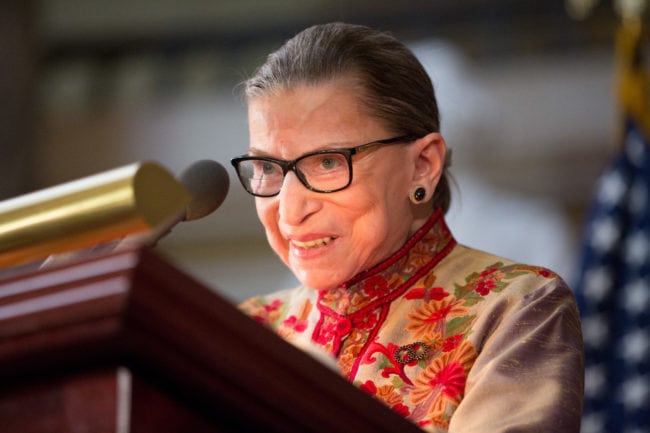Supreme Court justice Ruth Bader Ginsburg throws shade at Trump and vows to continue for ‘five more years’

Ruth Bader Ginsburg (Robin Marchant/Getty)
Supreme Court justice Ruth Bader Ginsburg has vowed to serve on the court for another five years – denying Donald Trump a chance to replace her with a conservative.
The Trump administration has taken advantage of vacancies on the highest court in the US to nominate ultra-conservative justices Neil Gorsuch and Brett Kavanaugh, who rights groups warn will tip the court’s fragile majority against LGBT rights and access to safe abortion.
But 85-year-old justice Ruth Bader Ginsburg, the court’s most consistent voice in favour of LGBT rights in legal battles, has vowed that she’s not going anywhere soon.

US Supreme Court Justice Ruth Bader Ginsburg (NICHOLAS KAMM/AFP/Getty)
Speaking at an event week, Ginsburg signalled that she plans to serve on the court for another five years, handily denying Donald Trump the chance to push through her replacement if she retires in 2023.
According to CNN, she said: “I’m now 85… my senior colleague, Justice John Paul Stevens, he stepped down when he was 90, so think I have about at least five more years.”
She noted that there are no term limits for Supreme Court seats, which are held until retirement or death.
Ginsburg said: “You can’t set term limits, because to do that you’d have to amend the Constitution.
“Article 3 says we hold our offices during good behavior, and most judges are very well behaved.”
Asked about what gives her hope, Ginsburg hinted at her dissatisfaction with events under Trump.

US Supreme Court Justice Ruth Bader Ginsburg (SAUL LOEB/AFP/Getty)
She said: “My dear spouse would say that the true symbol of the United States is not the bald eagle – it is the pendulum.
“And when it goes very far in one direction you can count on its swinging back.”
Ginsburg has earned an unlikely following among LGBT liberals in recent years thanks to her unwavering support for equality.
She attracted fury from conservatives by performing several same-sex weddings herself ahead of the court’s 2015 ruling on the issue.
Her frequent dissents from the court’s more conservative justices earned her the nickname ‘Notorious RBG’.
She penned one such dissent last month as the court ruled in favour of a bakery that refused to serve a same-sex couple.

US Supreme Court Justice Ruth Bader Ginsburg (Allison Shelley/Getty)
In her dissent, joined by Justice Sonia Sotomayor, Ginsburg wrote: “I strongly disagree with the Court’s conclusion that [gay couple] Craig and Mullins should lose this case.”
Asserting that the actions of the baker were discrimination, she wrote: “[The baker] Phillips declined to make a cake he found offensive where the offensiveness of the product was determined solely by the identity of the customer requesting it.
“When a couple contacts a bakery for a wedding cake, the product they are seeking is a cake celebrating their wedding — not a cake celebrating heterosexual weddings or same-sex weddings — and that is the service Craig and Mullins were denied.”
She challenged Chief Justice Kennedy’s assertion that the Colorado Civil Rights Commission (CCRC) discriminated against the baker based on his religious beliefs.
The court’s majority opinion had asserted that CCRC’s Commissioners were “hostile” to Phillips’ religious beliefs due to statements condemning his comments about LGBT people.
But Ginsburg wrote: “Whatever one may think of the statements in historical context, I see no reason why the comments of one or two Commissioners should be taken to overcome Phillips’ refusal to sell a wedding cake to Craig and Mullins.
“The proceedings involved several layers of independent decisionmaking, of which the Commission was but one.”
She concluded: “Sensible application of CADA [Colorado Anti-Discrimination Act] to a refusal to sell any wedding cake to a gay couple should occasion affirmance of the Colorado Court of Appeals’ judgment. I would so rule.”

